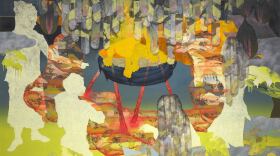The comedy “Girls Trip” is a standout success from this summer’s blockbuster season. The movie is about four best friends who take a wild and raunchy trip to New Orleans, and since its release last month, it has faired well with both audiences and critics. Meanwhile rapper Jay-Z released his highly-anticipated album “4:44” at the end of June.
The work features songs detailing how the veteran rapper grapples with marriage, fatherhood and masculinity. Host Frank Stasio talked about the latest in popular culture with Natalie Bullock Brown, professor of film and broadcast media at St. Augustine’s University in Raleigh, and Mark Anthony Neal, chair of the department of African and African American studies at Duke University in Durham.
INTERVIEW HIGHLIGHTS
On the plot and commercial success of “Girls Trip”
Natalie Bullock Brown (NBB): It is a look at what it means to have really close friends – to be apart from them. So how do you reconcile the ways your lives separate and depart, and when you come together – how does all of that play out. At the end of the day I think what it does really well is speak to the type of sisterhood that I think African-American women, myself included, really long for. And often, because of the business of our lives, lack. It’s really a lot of fun, but I left the film feeling like, “Dang, I need to reach out to some of my girlfriends, and we need to get together and do this type of trip on a regular basis.”
Mark Anthony Neal (MAN): There are films I see with my 19-year-old daughter, and there are films I see with my wife. There are very few films I see with both of them at the same time. “Girls Trip” was one of those films. Part of it is that it is just hilarious. Simone Drake wrote a piece on New Black Man, and she told me about the fact that it is also a celebration of black mobility, of black leisure time, of black joy. And guess what, sometimes black joy is raunchy and sometimes it is rated R … This is one of the most successful rated-R films we’ve seen in about a year. It’s the most successful comedy we’ve seen thus far this year. Folks always say you can't have a black ensemble cast that will cross over. When I went to the movie theater, half of the folks there were white.
On how “Girls Trip” portrays sisterhood and the middle-class experience"
NBB: In spite of all the things the women go through in this film … At the end of the day what matters to them is their relationship with each other. That’s what gets them through. That’s what they hold on to, and that’s what they want. I think in this age of reality TV where what we tend to see happen between black women is spats and fights and mudslinging and all this negativity, it is really refreshing and important to say that no, you know what, we may fight, but we love each other, and we’re going to ride or die with each other.
MAN: I think part of it has to deal with the fact that we’re talking about a middle-class experience. So there is a commonality about the middle-class experience. That’s [what] we learned about “The Bernie Mac Show” 15 years ago. It’s about a black family moving into a middle-class neighborhood. That resonated for folks. So I think that’s part of it. I think the genius of the film is that elevates aspects of black culture. Most white Americans have no idea what the Essence Festival is. It was a celebration of what has now been an institution in black communities for 20 years. I wouldn’t be surprised if the Essence Festival sees a bump up next year simply because of its presence in the film.
On the intimate and vulnerable aesthetic of Jay-Z’s recent album “4:44”
MAN: It’s amazing. It’s obviously the most mature work of his career. I would argue it’s the best. As someone who would define himself as a Jay-Z stan, and as somebody who also has devoted considerable scholarly time looking at the arc of his career, it’s not as surprising to me. We’ve seen inclinations of him moving toward this level of maturity for at least a decade or probably longer. But it’s the first album I think where he had a whole statement that spoke to the wholeness of what it means to be this grown 48-year-old black man who’s dealing with all these different responsibilities, to a wife, to children, to his career, to the industry he represents, but also a broader public that has expectations on him. When they look at where Harry Belafonte was when he was at 48 years old, or folks like that, there is a level of expectation that he is growing into and embracing.
NBB: It’s not by chance the album starts off with “Kill Jay-Z” ... I am not a Jay-Z stan. I really have not been a fan. This is the first Jay-Z album I have purchased. So I’m coming to this as a newbie, but I have followed certain parts of Jay-Z’s career. Certainly “Lemonade” brought me front and center to the issues within his marriage. But I think Jay-Z knows that there were going to be people who questioned, “What is this? Are you really going to try and sell this to us as authentic?” I think it’s brilliant that he dissects himself. He basically separates. He’s Shawn Carter over here looking at Jay-Z and saying, “This is what you’ve got to do. You’ve got to die.” I think that really speaks to what he is trying to do with this album.
On Jay-Z’s vulnerability in the hip-hop industry
NBB: It is incredibly difficult for men in American culture to be vulnerable. Take that to the nth degree within hip-hop. There are things that he is saying. The fact that he is self-reflective enough to be able to say that, “I saw the innocence in your eyes die because of something that I did.” To me you can’t just manufacture that. That comes from a real place of feeling and thought and introspection that we don’t often see. So yeah, I believe him. I think it’s credible. It’s authentic, and it makes me applaud him for at least having the courage to try to have this conversation in public, and to apologize and be willing to be vulnerable not only to his wife and his children but to us.
MAN: Hip-hop has very rarely rewarded black men for acknowledging their vulnerabilities. In fact when you see the kind of shift in Kanye’s career from very early Kanye to the Kanye we have now where we see much more hubris – the kind of hubris we would have associated with Jay-Z 20 years ago. Part of that is him getting beat up for actually acknowledging some of his vulnerabilities within that context. It’s an interesting moment in that regard.
ADVISORY: This video contains explicit language
https://www.youtube.com/watch?v=zSkA61esq_c
On the backlash against HBO’s upcoming series “Confederate”
NBB
: I think that a lot of the critiques that were leveled against the idea of a Confederate project centered around the fact that the people who brought it to HBO are two white men who are the ones who created “Game of Thrones.” And because of the way that race has been handled in “Game of Thrones,” folks were like, “Really, HBO? You’re going to give this project about race where essentially the South wins – the Confederacy wins? What is that about?” I think the critique is understandable. I think I understand at the same time because it has not come out yet, which is what the producers are saying, give it a chance and let’s see what it actually does. But I am one of those people who are just, “What in the world.”MAN: For those black producers and content producers who can’t get green-lit, I understand the anger. I am sure there have been many alt-history projects positioned that talk about black life. We’re seeing one that is going to be launched by Amazon almost in response to this. So I get that anger. But from the other side, from a critical standpoint, I am hard-pressed to not allow for the actual creation of the art to be able to critique. I think when all is said and done it also positions the possibility that the same kind of things will be used against black creativity – that black creativity could be shut down along those same basis. And that being said, we don’t know whether or not because of the context of this that it actually might in fact necessitate the creation of a black character that is far more radical than we would have ever imagined because the system would have been able to continue. Again, we don’t know any of those things yet because it hasn’t been produced.









